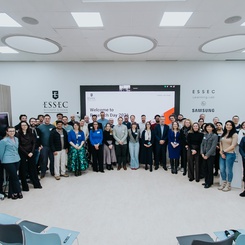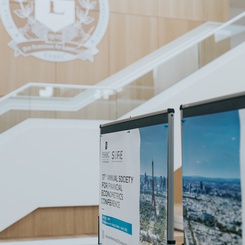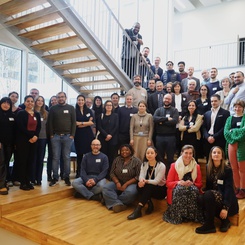With ESSEC Knowledge Editor-in-chief
Julia Smith, Editor in Chief of ESSEC Knowledge: Hello everyone and welcome to a new episode of Be in the Know, an ESSEC podcast bringing you the research and insights of ESSEC professors. I'm Julia Smith, the editor-in-chief of ESSEC Knowledge, and today I'm talking to Vivianna Fang He, Professor of Management, about her recent research studying collaborations between universities and industry. So over the last year or so, we've seen the fruits of such collaborations, in the form of the COVID-19 vaccine. The AstraZeneca vaccine was created working with Oxford University. In your study, you were looking at a similar kind of partnership, between a big pharma company and their university partners. Could you tell us a bit more about what the teams look like?
Vivianna Fang He, professor of management: If you just look at the individual members, the first impression you probably have is well, they are all very similar because very often they all wear white coats, and they are all highly educated scientists, many of them have more than one PhD. But if you look closer, they're also very different from each other, in terms of the disciplinary backgrounds, and deeper differences, like having different goals, so that struck me as a highly diverse team.
JS: Yeah, it's really interesting to kind of consider these teams and how they function. And so, in your study you're looking at each side's perspectives on their collaboration. So what exactly were you looking at there?
VFH: I was looking at, first of all, what is important for them? In this project, when I talked to one of the scientists, I asked her, so you have done hundreds of collaboration projects, what does the most successful one look like?'' And she answered, “Okay, the most successful one was actually from a project where two sides of collaboration had completely different goals.” That really surprised me because I am a social scientist, a social psychologist by training. Most of the teams research has shown the benefit of having congruent goals, of having shared goals within the group. We expect diverging goals to bring a lot of obstacles for collaboration, but for her (this scientist) the most successful ones were the ones when individual members have different goals. So that was really surprising. I asked her if she could elaborate on that and then she described the situation as one side was predominantly interested in publishing scientific articles and the other side interested in the final drugs, so the ownership of the final drug, and they could divide the cake: one side got all the cream, the other side got the entire cake, so actually they did not have to divide the cake, but each side could have 100% of what they wanted. So that was the initial surprising insight that prompted me to understand this better.
JS: Yeah, it's super interesting and like you said, it's a little counterintuitive to what we would think, but the way you explain it makes a lot of sense. I wonder what would you say some of your biggest takeaways are from this research?
VFH: A number of things- I think I can also go back to the surprising insights and mention this divergence was not the most detrimental thing for the collaboration. I think I should put the qualifier to that: it is not detrimental when you can effectively manage the conflict that comes with these divergent goals, and another surprising insight, related to that is, when, when the two partners have diverging perceptions of the conflict, that's even worse than the absolute level of conflict.
JS: Super interesting. Okay, so it's kind of like, maybe not all conflict is bad, but it depends on the kind of conflict and also how people are perceiving it and managing it right depends on the type and how you handle that.
VFH: That's also the reason why diverging perceptions are worse than the actual level of conflict because when both sides perceive the conflict level similarly, at least they can start to address that, they will find a way to work around it. But if only one side perceives a very high level of conflict and the other side was not completely aware of it or even aware of it, but not to the same extent, they will not take a very helpful approach to address the conflict. So that's when diverging goals manifest in different perceptions of conflict, and then when those conflicts are not resolved, it will really impact the outcome of collaboration.
JS: It's really interesting, especially given the importance of such collaborations and just the impact that can have on our society. And so I'm wondering if to piggyback off that a little bit. If you have any advice for academics, or for managers who are embarking on such a collaboration.
VFH: I would say the first thing to do is probably to get on the same page, to really take time to understand your collaboration partner to understand what is important for them. Once you have a good understanding of the relative importance of different goals, then you can start to find a way to work out those differences in a complimentary way. So sometimes you don't even have to make a trade off, if you can find a complimentary way to have those goals, although they are different, but you could have an incentive system designed or manage the governance of the collaboration, working in a way that you can deal with these differences and you can even exploit these differences to make the collaboration more successful.
JS: That's super interesting. Thank you so much for joining us today. Vivianna, is there anything else that you would like to add before we sign off?
VFH: I would like to mention the importance of understanding and monitoring the conflict. I'm not saying that conflict is always harmful, but without effective management of the conflict, it could be harmful.
JS: It's a really important thing to keep in mind. So thank you so much again for joining us and for shedding some light on the team dynamics of academia-industry collaborations, a really pertinent subject today. I look forward to reading more of your research in the future.
VFH: Thank you, Julia, for this opportunity.
: See you next time everyone.









